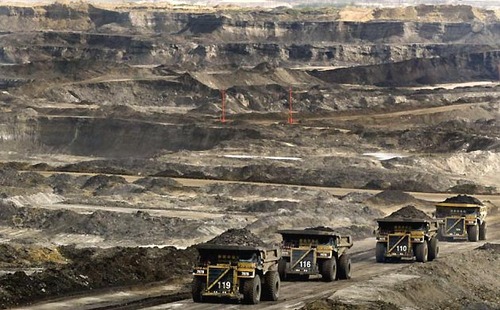This is a guest post by David Suzuki.
It sometimes seems people in the mining and fossil fuel industries — along with their government promoters — don’t believe in the future. What else could explain the mad rush to extract and use up the Earth’s resources as quickly and wastefully as possible?
Global mining production, including fossil fuels, has almost doubled since 1984, from just over nine-billion tonnes to almost 17-billion in 2012, with the greatest increases over the past 10 years.
It’s partly to meet rising demand from expanding human populations and supply the cycle of consumerism that fuels the global economy through planned obsolescence, marketing unnecessary products and wasteful technologies. And, as the British Geological Survey notes, “It may be uncomfortable to acknowledge, but wars have been the drivers for many of mankind’s technological developments. Such technologies depend on secure supplies of numerous mineral commodities for which demand inevitably escalates in times of war.”
Mining is important to human well-being, but the current economic system means it’s often aimed at maximizing profit with little regard for people or the environment. It’s one area where Canadians can make a difference. Canada is a global leader in mining, especially in Latin America. According to the Mining Association of Canada, “Almost 60% of the world’s public mining companies are listed on the TSX and TSX-Venture Exchanges, and 70% of the equity capital raised globally for mining companies is raised on these exchanges.” The association adds, “Canadian-headquartered mining companies accounted for nearly 37% of budgeted worldwide exploration expenditures in 2012.” Canada has also tied foreign aid to support for mining interests.
Canadian mining companies haven’t always had a great record for environmental and social responsibility in communities where they operate — but public scrutiny and pressure may be helping to change that. In the face of criticism, industry leaders insist practices are improving. “The Canadian mining industry, and certainly what our members are doing now, is much, much different now than what it was 20, 25 years ago,” Canadian Mining Association president and CEO Pierre Gratton told Global News in response to a critical Council on Hemispheric Affairs article.
According to the June 2014 article, “Large-scale Canadian mining companies, and the Canadian government that oversees such commercial ventures, have failed to adhere to reliable standards of international law, which assert that home states are responsible for the actions of their citizens abroad.” The article points to evidence that Canadian mining corporations have often operated with little regard for nature reserves and protected areas, and have depleted scarce water supplies, neglected indigenous rights and disrupted communities and created health problems through air, water and land pollution. “Each year, a number of protestors who raise concerns against mining activities are seriously injured, persecuted, or even killed.”
That appears to be the case at a gold- and silver-mining operation in Guatemala run by a subsidiary of Canada’s Goldcorp. According to the Guardian, it’s drawn numerous local complaints for “intimidation, threats, social division, violence, bribery and corruption of local authorities, destruction and contamination of water sources, livestock dying, houses shaking, cracked walls, the criminalization of protest, forest cleared, and appalling health impacts such as malnutrition and skin diseases.” An indigenous man who spoke against the mine was beaten and burned alive by hooded men who first questioned him about anti-mining activities. Goldcorp has denied the allegations.
In the past, Canadian companies haven’t been held responsible for actions of foreign subsidiaries — but that may change. A number of people from Eritrea and Guatemala are suing three Canadian mining companies in Canadian courts for alleged abuses at mines in those countries, which include forced labour, human rights violations and assault. The Financial Post said lawyers are getting around the “corporate veil” by “suing the Canadian parents for negligence and other traditional torts on the grounds that management hasn’t lived up to the standards outlined in their public pronouncements.” In other words, the companies are being held globally to the standards they publicly claim at home.
Mining is important but, as with much human activity in the face of rapidly growing populations, we must learn to develop and use resources in ways that aren’t wasteful, destructive and unsustainable. And mining companies must be held to high standards for environmental and human rights protection — at home and abroad.
Written with contributions from David Suzuki Foundations Senior Editor Ian Hanington.
Learn more at www.davidsuzuki.org.
Image credit: Council on Hemispheric Affairs.
Subscribe to our newsletter
Stay up to date with DeSmog news and alerts






